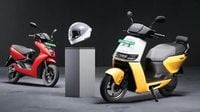Ather Energy, a pioneer in the Indian electric two-wheeler (E2W) market, made its much-anticipated stock market debut on May 6, 2025. The company’s initial public offering (IPO) was priced in the range of ₹304 to ₹321 per share, with shares listing at ₹328 on the National Stock Exchange (NSE), reflecting a premium of 2.18% over the upper limit of the IPO price. On the Bombay Stock Exchange (BSE), shares opened at ₹326.05, representing a 1.57% increase from the issue price.
Despite the initial excitement, Ather Energy’s shares fell sharply throughout the day, closing down 6% to ₹308.3 on the NSE. The decline raised concerns among investors about the company's future performance, particularly in a competitive market where many electric vehicle (EV) manufacturers are struggling to achieve sustainable profitability.
The IPO was well-received, with a total subscription of 1.43 times, driven primarily by retail investors and qualified institutional buyers (QIBs), who subscribed 1.78 and 1.70 times their respective quotas. However, non-institutional investors showed weaker interest, with only 66% of their allocated shares being subscribed. This mixed response reflects broader market conditions and investor sentiment towards the electric vehicle sector.
Ather Energy’s IPO comprised a fresh issue of equity shares valued at ₹2,626 crore and an offer-for-sale of 1.1 crore equity shares from existing stakeholders, including major investors like Hero MotoCorp, which holds a 38.19% stake in the company. Other significant shareholders include Caladium Investment (GIC) with 15.43%, and the National Investment and Infrastructure Fund (NIIF) at 14.22%.
The company plans to use the proceeds from the IPO to fund various initiatives, including the establishment of a new manufacturing facility in Maharashtra, investment in research and development (R&D), marketing efforts, and debt repayment. Specifically, Ather Energy intends to allocate ₹927.2 crore for the new plant, ₹750 crore for R&D, ₹300 crore for marketing, and ₹40 crore for clearing existing debts, all scheduled to be utilized from FY26 to FY28.
In the financial year 2023-24, Ather Energy reported a 3.2% decline in revenue, totaling ₹1,913.5 crore, compared to ₹1,976.8 crore in the previous fiscal year. The company also recorded a net loss of ₹1,059.7 crore, an increase from the ₹864.5 crore loss in FY23. This trend of increasing losses and declining revenues raises questions about the company’s profitability and long-term viability in an increasingly competitive market.
Industry analysts have expressed mixed views on Ather Energy's future. Prashanth Tapse, Senior Vice President of Research at Mehta Equities, commented, “As expected, we see a flat listing, which was justified, as the issue was aggressively priced, especially when benchmarked against peer OLA Electric. We continue to believe the electric two-wheeler (EV 2W) segment remains highly competitive and capital-intensive, with most players, including market leaders, struggling to achieve sustainable profitability and raising concerns with new investors.”
Despite these challenges, Ather Energy has positioned itself as a premium brand in the electric two-wheeler market, focusing on quality and innovation. The company has been recognized for its technological advancements and aims to differentiate itself from competitors like OLA Electric, TVS Motor, and Bajaj Auto.
Ather Energy's journey began in 2013, making it one of the earliest entrants in the Indian electric scooter market. The company has developed a comprehensive ecosystem that includes not only electric scooters but also software, charging infrastructure, and smart accessories, all designed and conceptualized in India. This integrated approach is intended to enhance user experience and drive adoption of electric vehicles.
Looking ahead, Ather Energy's CEO, Tarun Mehta, expressed optimism about the company's growth prospects. In a recent interview, he noted, “We expect margins, volumes, and market share to improve in FY26. The volume growth for FY26 is anticipated to surpass what was experienced in 9MFY25.”
Ather Energy's IPO is significant not only for the company but also for the broader EV market in India, which saw total domestic sales of motorized two-wheelers reach 18.4 million units in the fiscal year 2024. This growth indicates a promising outlook for the electric vehicle segment as the country aims to transition to more sustainable transportation options.
As the market evolves, Ather Energy will need to navigate the challenges of competition, profitability, and consumer demand. The company’s ability to leverage its technology, expand its manufacturing capabilities, and effectively market its products will be crucial in determining its success in the coming years.
In summary, while Ather Energy's IPO debut was met with initial enthusiasm, the subsequent decline in share price highlights the volatile nature of the electric vehicle market. Investors will be watching closely to see how the company utilizes its IPO proceeds and whether it can turn around its financial performance in the face of increasing competition and market challenges.





